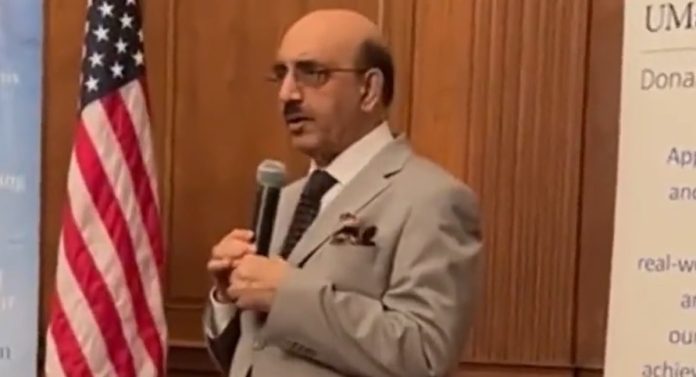Pakistan’s Ambassador to the United States, Masood Khan, has observed that there was no misunderstanding between the United States and Pakistan over Islamabad’s move to buy discounted Russian oil amid severe economic and energy challenges. While addressing a think tank event on Pakistan-US relations, Ambassador Khan noted that Pakistan has placed the first order for Russian oil, and this has been done in consultation with the United States government. Meanwhile, Pakistan’s deal with Russia going well in the price cap range set by the G7 and European countries on Russian oil to help prevent Moscow’s financing of its war against Ukraine. According to the Pakistani envoy, Pakistan’s ties with the United States went through a brief period of uncertainty after the US-led foreign troops withdrew from Afghanistan and the Taliban seized control of the country. Masood Khan claimed that the reset Islamabad-Washington relationship is transcending the past.
Pakistan and the United States have a long history of bilateral relations that witnessed multiple ups and downs and went through several phases of impressive cooperation and severe diplomatic split-ups over the past seven and a half decades. Both nations had enjoyed historic cordial relations in the 1950s when the newly liberated state of Pakistan opted to join the Western bloc during the initial years of the cold war. Multiple defense and security pacts and Pakistan’s important role in the furtherance of American interests cemented Pakistan-US ties. Later, Pakistan’s role as a front-line state in the Afghan jihad against the former Soviet Union placed Pakistan on the list of most favorite nations of the United States, however, Pakistan’s quest for nuclear deterrence and progress in the nuclear field always remained a bitter truth for American Strategists who offered resistance and instated barriers on US economic and military assistance to Islamabad that seriously undermined Pak-US relations and bilateral cooperation throughout history. After the 9/11 attacks, Pakistan again decided to join US-led War on Terror (WoT) because the American nation was under attack at that time and the US government demanded crucial help from Islamabad. As a result, Pakistan paid a heavy price for supporting the US war against terrorism but the world’s sole power leveled baseless accusations against Pakistan for all its failures and defeat in Afghanistan.
As Ambassador Khan highlighted that Pak-US relations suffered a brief period of uncertainty after the US-led foreign military withdrawal from Afghanistan despite the fact Pakistan played a pivotal role in the commencement of the US-Taliban dialogue and the conclusion of the historic Doha agreement, while the country also facilitated the evacuation of the US troops, civilians and western diplomats from Afghanistan. In fact, Pakistan’s decision to apart itself from the so-called democracy summit, an anti-China gathering hosted by the United States has been viewed by the US government with concern and Washington categorically expressed its displeasure through manipulation of Pakistan’s long-awaited deal with the International Monetary Fund (IMF). Meanwhile, US’s military and economic assistance to Pakistan had been reduced significantly while foreign military sales and training are suspended since 2017. Apparently, Ambassador Khan has expressed optimism because of the sensitivities attached to his ambassadorial assignment, otherwise, Pak-US relations had always been of a transactional nature and currently, their bond only could be forged on terrorism and China.
Realistically, the foreign policy of all sovereign nations revolves around their national interests which they pursue through collaboration with friendly nations, partners, and allies. Washington first abandoned its longstanding South Asian ally by forging a multi-prong strategic partnership with New Delhi and currently coaxing Islamabad to scarify its relationship with Beijing and join Washington’s alliance against its neighbor. Both nations are currently engaged in multiple domains but the pace of their engagement is minimal. Islamabad is endeavoring hard to create balance and maintain mutually beneficial relationships with both powers but facing hurdles from both sides. In fact, enhanced Pak-US ties are not only important for both countries but very crucial for regional peace and stability, therefore both nations must work to preserve and augment this relationship in the future.







